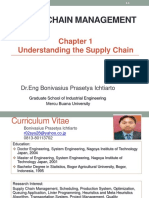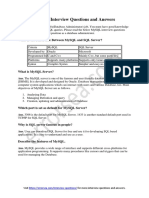0 ratings0% found this document useful (0 votes)
1 viewsLect 1 - Introduction To SCM
Lect 1 - Introduction To SCM
Uploaded by
joinrizwanSCM Lectures
Copyright:
© All Rights Reserved
Available Formats
Download as PPTX, PDF, TXT or read online from Scribd
Lect 1 - Introduction To SCM
Lect 1 - Introduction To SCM
Uploaded by
joinrizwan0 ratings0% found this document useful (0 votes)
1 views32 pagesSCM Lectures
Original Title
Lect 1_Introduction to SCM
Copyright
© © All Rights Reserved
Available Formats
PPTX, PDF, TXT or read online from Scribd
Share this document
Did you find this document useful?
Is this content inappropriate?
SCM Lectures
Copyright:
© All Rights Reserved
Available Formats
Download as PPTX, PDF, TXT or read online from Scribd
Download as pptx, pdf, or txt
0 ratings0% found this document useful (0 votes)
1 views32 pagesLect 1 - Introduction To SCM
Lect 1 - Introduction To SCM
Uploaded by
joinrizwanSCM Lectures
Copyright:
© All Rights Reserved
Available Formats
Download as PPTX, PDF, TXT or read online from Scribd
Download as pptx, pdf, or txt
You are on page 1of 32
Supply Chain Management
(MS-409)
Lecture – 1
Introduction to Supply Chain
Management
Course Instructor: Dr. Ammar ul Hassan
Email Id: amar.hassan@uettaxila.edu.pk
Department of Mechanical Engineering,
University of Engineering & Technology,
Program Learning Outcome
This course is designed in conjunction with the following PLOs.
• PLO-6: Engineer and Society: An ability to apply reasoning informed by
contextual knowledge to assess societal, health, safety, legal and cultural
issues and the consequent responsibilities relevant to professional
engineering practice and solution to complex engineering problems.
• PLO-8: Ethics: Apply ethical principles and commit to professional ethics
and responsibilities and norms of engineering practice.
• PLO-9: Individual and Team Work: An ability to work effectively, as an
individual or in a team, on multifaceted and /or multidisciplinary settings.
Program Learning Outcome
This course is designed in conjunction with the following PLOs.
• PLO-10: Communication: An ability to communicate effectively, orally
as well as in writing, on complex engineering activities with the
engineering community and with society at large, such as being able to
comprehend and write effective reports and design documentation, make
effective presentations, and give and receive clear instructions.
• PLO-11: Project Management: An ability to demonstrate management
skills and apply engineering principles to one’s own work, as a member
and/or leader in a team, to manage projects in a multidisciplinary
environment.
Course Learning Outcome (CLO)
Upon successful completion of this course, students will be able to:
• CLO-1. Understand the Supply Chain Management, Principles, Strategies,
Sustainability and Supply Chain, Supply Chain Drivers and Metrics;
Production, Inventory, Location, Transportation, Information
• CLO-2. Apply ethical engineering principles in Supply Chain Management.
• CLO-3. Analyze the Supply Chain Network, Planning and Coordination of
Demand and Supply in a Supply Chain.
Course Learning Outcome (CLO)
Upon successful completion of this course, students will be able to:
• CLO-4. Analyze the Transportation Networks, Warehousing Management,
Information Technology in Supply Chain
• CLO-5. Apply the engineering principles on Material Handling, Planning
and Managing Inventories in Supply Chain
Mapping of CLOs to PLOs and Learning Domains
Course Program Learning
Learning Learning Domain
Outcome Outcome
CLO - 1 PLO – 6 C2
CLO – 2 PLO – 8 C3
CLO - 3 PLO - 9 C4
CLO - 4 PLO – 10 C4
CLO - 5 PLO - 11 C3
Mapping of CLOs to PLOs and Learning Domains
Course Contents
• Understanding of Supply Chain Management
• Supply Chain Drivers and Metrics; Production, Inventory, Location,
Transportation, Information
• Managing Supply Chain Risks
• Designing the Supply Chain Network
• Planning and Coordination of Demand and Supply in a Supply Chain
Course Contents
• Material Handling in Supply Chain
• Planning and Managing Inventories in Supply Chain
• Designing and Planning Transportation Networks
• Warehousing Management
• Information Technology in Supply Chain
• Sustainability and the Supply Chain
Textbooks
• Supply Chain Management: Strategy, Planning, and
Operations (Chopra, Sunil, and Peter Meindl,
Objective
• Aims
• To provide and insight on Supply Chain Management
• To provide details on why we need SCM and its characteristics
• Expected Outcomes
• Learner will be able to know about SCM
• Learner will be able to identify role of SCM in today's sceneries
• Other related Information
• Student must have some fundamental ideas on materials,
manufacturing processes, inventory models, and transportation
Some Basic Definitions
• Supply chain management (SCM) is the management of flow of
goods, information, and finances related to a product or service,
from the procurement of raw materials to the delivery of the product
at its destination.
Some Basic Definitions
Some Basic Definitions
Some Basic Definitions
• Supply chain management (SCM) deals with the procurement
(purchasing raw materials/ components), operations management
(ensuring the production of high-quality products at high speed with
good flexibility and low production cost), logistics and marketing, so
that the raw materials can be converted into a finished products and
delivered to the end customer.
Some Basic Definitions
• A supply chain is a collection of suppliers required to create one specific product
for a company.
• The chain is made up of nodes or “links,” which can include multiple
manufacturers for parts, then the completed product, then the warehouse where
it is stored, then its distribution centers, and finally, the store where a consumer
can purchase it.
• The concept of the chain is important, because each link is connected in a
specific direction and order, and the next link cannot be reached without going
through the previous one.
• Each link adds time and costs, and can involve labor, parts, and transportation.
• Every product a company carries may have its own supply chain, though they
may use certain suppliers for multiple products.
Some Basic Definitions
Some Basic Definitions
• As the name implies, supply chain management (SCM) is handling and
optimizing all the many complicated aspects of a supply chain, involving goods
and services.
• Supply chain management refers to the coordination and oversight of various
activities involved in the production, distribution, and delivery of goods or
services from their source to the end consumer.
• Supply chain managers have two key responsibilities:
1.Ensure that customers can obtain products.
2.Ensure that the manufacturer can obtain the materials they need to create the
product.
Some Basic Definitions
• Supply chain management
(SCM) is the art of
coordination the flow of goods
and services from raw
materials to final customers.
Some Basic Definitions
• Supply Chain Management can be defined as the management of flow of
products and services, which begins from the origin of products and ends
at the product’s consumption.
• It also comprises movement and storage of raw materials that are involved
in work in progress, inventory and fully furnished goods.
• The main objective of supply chain management is to monitor and relate
production, distribution, and shipment of products and services.
Some Basic Definitions
Some Basic Definitions
Some Basic Definitions
Some Basic Definitions
Some Basic Definitions
• A supply chain is the alignment of firms that bring products or services to
market.
• A supply chain consists of all stages involved, directly or indirectly, in
fulfilling a customer request. The supply chain not only includes the
manufacturer and suppliers, but also transporters, warehouses, retailers,
and customers themselves.
Some Basic Definitions
• A supply chain is a network of facilities and distribution options that
performs the functions of procurement of materials, transformation of
these materials into intermediate and finished products, and the
distribution of these finished products to customers.
• Supply chain management is the coordination of production, inventory,
location, and transportation among the participants in a supply chain to
achieve the best mix of responsiveness (quickly) and efficiency for the
market being served.
SCM Advantages
• In this era of globalization where companies compete to provide the best quality products
to the customers and satisfy all their demands, SCM plays a very important role.
SCM Advantages
• The key benefits of supply chain management are as follows −
• Develops better customer relationship and service.
• Creates better delivery mechanisms for products and services in demand with
minimum delay.
• Minimizes warehouse and transportation costs.
• Minimizes direct and indirect costs.
• Assists in achieving shipping of right products to the right place at the right time.
• Enhances inventory management, supporting the successful execution of just-in-time
stock models.
• Assists companies in minimizing waste, driving out costs, and achieving efficiencies
throughout the supply chain process.
SCM Goals
• Every firm struggles to match supply with demand in a timely fashion with the most
efficient use of resources.
• Here are some of the important goals of supply chain management −
• Supply chain partners work collaboratively at different levels to maximize resource
productivity, construct standardized processes, remove duplicate efforts and minimize
inventory levels.
• Minimization of supply chain expenses is very essential.
• Cost efficient and cheap products are necessary, but supply chain managers need to
concentrate on value creation for their customers.
• Exceeding the customers’ expectations on a regular basis is the best way to satisfy
them.
• Increased expectations of clients for higher product variety, off-season availability of
inventory and rapid fulfillment at a cost comparable to in-store offerings should be
The End
You might also like
- Supply Chain Management For Agricultural ProductsDocument41 pagesSupply Chain Management For Agricultural ProductsSangita100% (17)
- Xenogears Official Strategy Guide - Text PDFDocument227 pagesXenogears Official Strategy Guide - Text PDFZhong Shi50% (2)
- FS Episode 8Document18 pagesFS Episode 8Abegail Linaga93% (104)
- Project Report On SCMDocument16 pagesProject Report On SCMmanas sibal0% (2)
- Global SCMDocument303 pagesGlobal SCMmohamedadelali100% (3)
- Lectura 4 - KPMG Avoiding Major Project FailureDocument8 pagesLectura 4 - KPMG Avoiding Major Project FailureMayra GálvezNo ratings yet
- Illustrated Notes-Form One and Two NotesDocument131 pagesIllustrated Notes-Form One and Two NotesDi'genius Neshmentation100% (3)
- Messerschmitt BF 109 FIGHTER 1935Document114 pagesMesserschmitt BF 109 FIGHTER 1935Mihai Iavorschi100% (3)
- Lecture On Global Chain Supply ManagementDocument109 pagesLecture On Global Chain Supply ManagementADAGBA DAMIANNo ratings yet
- Introduction To SCMDocument28 pagesIntroduction To SCMRaviteja GogineniNo ratings yet
- SCM Chapter 1Document24 pagesSCM Chapter 1Msy MesayNo ratings yet
- Operations Management TheoryDocument26 pagesOperations Management Theorymishtix4No ratings yet
- Chapter 1 - Intro To Supply Chain ManagementDocument38 pagesChapter 1 - Intro To Supply Chain ManagementROSARIO CHARLENE IRISH P.No ratings yet
- Introduction To SCMDocument35 pagesIntroduction To SCMSha KhNo ratings yet
- Introduction To Supply Chain Planning AnDocument53 pagesIntroduction To Supply Chain Planning Anjacob1029No ratings yet
- HPC Module 1Document6 pagesHPC Module 1Jane Ednalaga GorospeNo ratings yet
- SCM Module-1Document11 pagesSCM Module-1ankitpatra070No ratings yet
- Introduction To SCMDocument38 pagesIntroduction To SCMArif Shan50% (2)
- Supply Chain Management: Prof.G.Purandaran M.Tech (I.I.T-Madras) PGDM (I.I.M-Bangalore)Document63 pagesSupply Chain Management: Prof.G.Purandaran M.Tech (I.I.T-Madras) PGDM (I.I.M-Bangalore)pura_malliNo ratings yet
- CHP - 49 - Lean and Agile Supply ChainDocument14 pagesCHP - 49 - Lean and Agile Supply ChainSiddesh SiddappaNo ratings yet
- International Logistics: Lecture 5: Supply Chain Management and ProcurementDocument52 pagesInternational Logistics: Lecture 5: Supply Chain Management and ProcurementHồng Anh LêNo ratings yet
- Unit 4Document67 pagesUnit 4aayushkumardav12No ratings yet
- LSCMDocument6 pagesLSCMdevilNo ratings yet
- Module 1.1Document22 pagesModule 1.1Jayesh BorseNo ratings yet
- Unit 5Document40 pagesUnit 5rathoreriyasingh4No ratings yet
- INTRODUCTION TO Supply Chain ManagementDocument15 pagesINTRODUCTION TO Supply Chain ManagementDr.Rachanaa DateyNo ratings yet
- Supply Chain ManagementDocument61 pagesSupply Chain ManagementAbelaNo ratings yet
- Supply Chain ManagementDocument67 pagesSupply Chain ManagementAvijit Dinda100% (1)
- SCLM Notes 19Document90 pagesSCLM Notes 19Prateek DixitNo ratings yet
- Bonny SCM 1Document30 pagesBonny SCM 1Atikah ANo ratings yet
- MGMT 655: Chapter 1 Understanding The Supply Chain: Prof. Willem SelenDocument38 pagesMGMT 655: Chapter 1 Understanding The Supply Chain: Prof. Willem SelenAhmedNo ratings yet
- Chapter 1 For 2nd Yr Evolution of Supply ChainDocument25 pagesChapter 1 For 2nd Yr Evolution of Supply Chaintsion alemayehuNo ratings yet
- Supply Chain ManagementDocument54 pagesSupply Chain ManagementWeza WezaNo ratings yet
- Sourcing - Logistics - LEC01 04102023 064133pmDocument31 pagesSourcing - Logistics - LEC01 04102023 064133pm7drkn2vtybNo ratings yet
- Intoduction To Supply Chain ManagementDocument32 pagesIntoduction To Supply Chain ManagementKriselle Pearl TonhayNo ratings yet
- TOPIC 2 - The Supply Chain Management ConceptDocument44 pagesTOPIC 2 - The Supply Chain Management ConceptLê Tú NgọcNo ratings yet
- Introduction To Logistics and Supply ChainDocument25 pagesIntroduction To Logistics and Supply ChainAmanda CheongNo ratings yet
- Supply Chain Management in Retail ManagementDocument83 pagesSupply Chain Management in Retail ManagementMohammadAneesNo ratings yet
- LSCM 2024Document49 pagesLSCM 2024riaukey1234No ratings yet
- Supply Chain Modeling For Decision-Making LSCM 611-3 ECTS: 3.5Document194 pagesSupply Chain Modeling For Decision-Making LSCM 611-3 ECTS: 3.5Lê Thị Ngọc DiễmNo ratings yet
- SCM PPT CH 1-4Document64 pagesSCM PPT CH 1-4ashu tkNo ratings yet
- Chapter 1 - Understanding The Supply Chain-StDocument29 pagesChapter 1 - Understanding The Supply Chain-StQuynh Chau TranNo ratings yet
- Chapter 1 - Fundamentals of Logistics and Supply Chain ManagementDocument29 pagesChapter 1 - Fundamentals of Logistics and Supply Chain ManagementTrần Thanh TrúcNo ratings yet
- Logistics and Supply Chain Management As Competitive Advantage-A StudyDocument13 pagesLogistics and Supply Chain Management As Competitive Advantage-A StudyswatikjmNo ratings yet
- Supply Chain Management: Peeyush Pandey Assistant Professor IIM RohtakDocument30 pagesSupply Chain Management: Peeyush Pandey Assistant Professor IIM RohtakSanyam JainNo ratings yet
- Operations MGMTDocument77 pagesOperations MGMTDinesh SharmaNo ratings yet
- Unit-I Supply Chain Management: Dr.P.Nivetha Assistant Professor Department of Management StudiesDocument34 pagesUnit-I Supply Chain Management: Dr.P.Nivetha Assistant Professor Department of Management Studiesshahina begumNo ratings yet
- 123supply Chain PDFDocument72 pages123supply Chain PDFSandhya sanjuNo ratings yet
- Unit 3: Supply Chain, Purchase and Stores Management: Prepared by Dr. R. ArivazhaganDocument58 pagesUnit 3: Supply Chain, Purchase and Stores Management: Prepared by Dr. R. ArivazhaganSusrii SangitaNo ratings yet
- Supply Chain Management & Logistics (SCML) : Department of Operation ManagementDocument57 pagesSupply Chain Management & Logistics (SCML) : Department of Operation ManagementAbdul AleemNo ratings yet
- Unit 1 SCMDocument112 pagesUnit 1 SCMJanmejai BhargavaNo ratings yet
- Supply Chain Managemen T: PresenterDocument36 pagesSupply Chain Managemen T: PresenterSangita KcNo ratings yet
- Supply Chain MnagementDocument33 pagesSupply Chain MnagementMuhammad Rafiqul IslamNo ratings yet
- SCM 352 CH 1Document12 pagesSCM 352 CH 1Robert JungnitschNo ratings yet
- Session I - Introduction Course On Supply Chain ManagementDocument38 pagesSession I - Introduction Course On Supply Chain Managementanu0512100% (1)
- Introduction To Supply Chain ManagementDocument48 pagesIntroduction To Supply Chain ManagementQuality OfficeNo ratings yet
- SCM Infrastructure PradeepDocument33 pagesSCM Infrastructure PradeepPradeep Kumar MNo ratings yet
- TransportDocument12 pagesTransportTinotenda ChimbwandaNo ratings yet
- Chapter 1-Introduction To SCM PDFDocument27 pagesChapter 1-Introduction To SCM PDFThandolwethu MbathaNo ratings yet
- Unit II SCM MBADocument52 pagesUnit II SCM MBARaghav SharmaNo ratings yet
- Lecture 1 - Understanding The Supply ChainDocument27 pagesLecture 1 - Understanding The Supply ChainNhi Nguyễn Thị NgânNo ratings yet
- The Supply Chain Management ConceptDocument44 pagesThe Supply Chain Management ConceptViVi TruongNo ratings yet
- Supply Chain PresentationDocument43 pagesSupply Chain Presentationanithavarghese73058100% (1)
- Logistics in Manufacturing, Supply Chain, and Distribution: The Supply Chain Journey, #1From EverandLogistics in Manufacturing, Supply Chain, and Distribution: The Supply Chain Journey, #1No ratings yet
- Correlation AnalysisDocument18 pagesCorrelation AnalysissalhotraonlineNo ratings yet
- EMA Biosimilar Guide For Healthcare ProfessionalsDocument38 pagesEMA Biosimilar Guide For Healthcare ProfessionalsDan Stanton100% (2)
- Measure of Central Tendency - QuestionsDocument14 pagesMeasure of Central Tendency - QuestionsMohd HannanNo ratings yet
- Tamminen Tuire Dissertation 2020Document118 pagesTamminen Tuire Dissertation 2020Carolina Duque RodriguezNo ratings yet
- Teaching Grammar To Young LearnersDocument9 pagesTeaching Grammar To Young LearnersDado DodoNo ratings yet
- Eraser Treatmenty On PaperDocument13 pagesEraser Treatmenty On Papergomez.teran.ximenaNo ratings yet
- Cable 3 X50Document2 pagesCable 3 X50Jalal AlbadriNo ratings yet
- Integrated Humanities Notes: SuperpowersDocument15 pagesIntegrated Humanities Notes: SuperpowersAimal RashidNo ratings yet
- LogDocument27 pagesLogchaaanrikkaNo ratings yet
- From Saviour To Colonial Perpetrator Manipulating Player Empathy in Silent Hill 2 and Silent Hill OriginsDocument17 pagesFrom Saviour To Colonial Perpetrator Manipulating Player Empathy in Silent Hill 2 and Silent Hill OriginstiannixukellyNo ratings yet
- Analaysis of 1940s/50s and Modern Advert Representing WomenDocument4 pagesAnalaysis of 1940s/50s and Modern Advert Representing WomenOmarNo ratings yet
- Teaching Beginners 2Document3 pagesTeaching Beginners 2Rubens RibeiroNo ratings yet
- BENG101L - Technical English Communication - TheoryDocument2 pagesBENG101L - Technical English Communication - TheoryMohnish KodukullaNo ratings yet
- NURSING RESEARCH I Houserules and SyllabusDocument17 pagesNURSING RESEARCH I Houserules and SyllabusAndrea Asdala SairunaNo ratings yet
- A - T - Warning Lamp ON - Fail-Safe Mode - DTC's 059 - 065 (Transmission and Drivetrain) - ALLDATA Rep..Document2 pagesA - T - Warning Lamp ON - Fail-Safe Mode - DTC's 059 - 065 (Transmission and Drivetrain) - ALLDATA Rep..Vito RenzyNo ratings yet
- MySQL Interview Questions and Answers For Experienced and FreshersDocument5 pagesMySQL Interview Questions and Answers For Experienced and FreshersMohmad Ashik M ANo ratings yet
- IFMA FMPv3-0 F-B Ch4Document46 pagesIFMA FMPv3-0 F-B Ch4Mohamed IbrahimNo ratings yet
- "Production of Hydrogen Gas Using Gasification From BiomassDocument40 pages"Production of Hydrogen Gas Using Gasification From BiomassFaizNo ratings yet
- Ex, Seven PS, McDonald ExampleDocument1 pageEx, Seven PS, McDonald Examplekoko lambNo ratings yet
- (CC1) LEC-W12-Nonprotein Nitrogen CompoundsDocument10 pages(CC1) LEC-W12-Nonprotein Nitrogen CompoundsAira UsiNo ratings yet
- The Effects of Essence-Formed Cosmetic Ingredients Containing The GalactomycesDocument8 pagesThe Effects of Essence-Formed Cosmetic Ingredients Containing The GalactomycesLwsynergylab OfficialNo ratings yet
- Fundamentals of Electromagnetic Compatibility (EMC) DesignDocument28 pagesFundamentals of Electromagnetic Compatibility (EMC) DesignSasidhar Reddy VundelaNo ratings yet
- Wh-Questions ElementaryDocument31 pagesWh-Questions ElementarySofìa RamìrezNo ratings yet
- Free FeesDocument328 pagesFree FeesYash GuptaNo ratings yet
- Legal and Forensic Medicine Notes PDFDocument16 pagesLegal and Forensic Medicine Notes PDFYor Cabz50% (4)

























































































